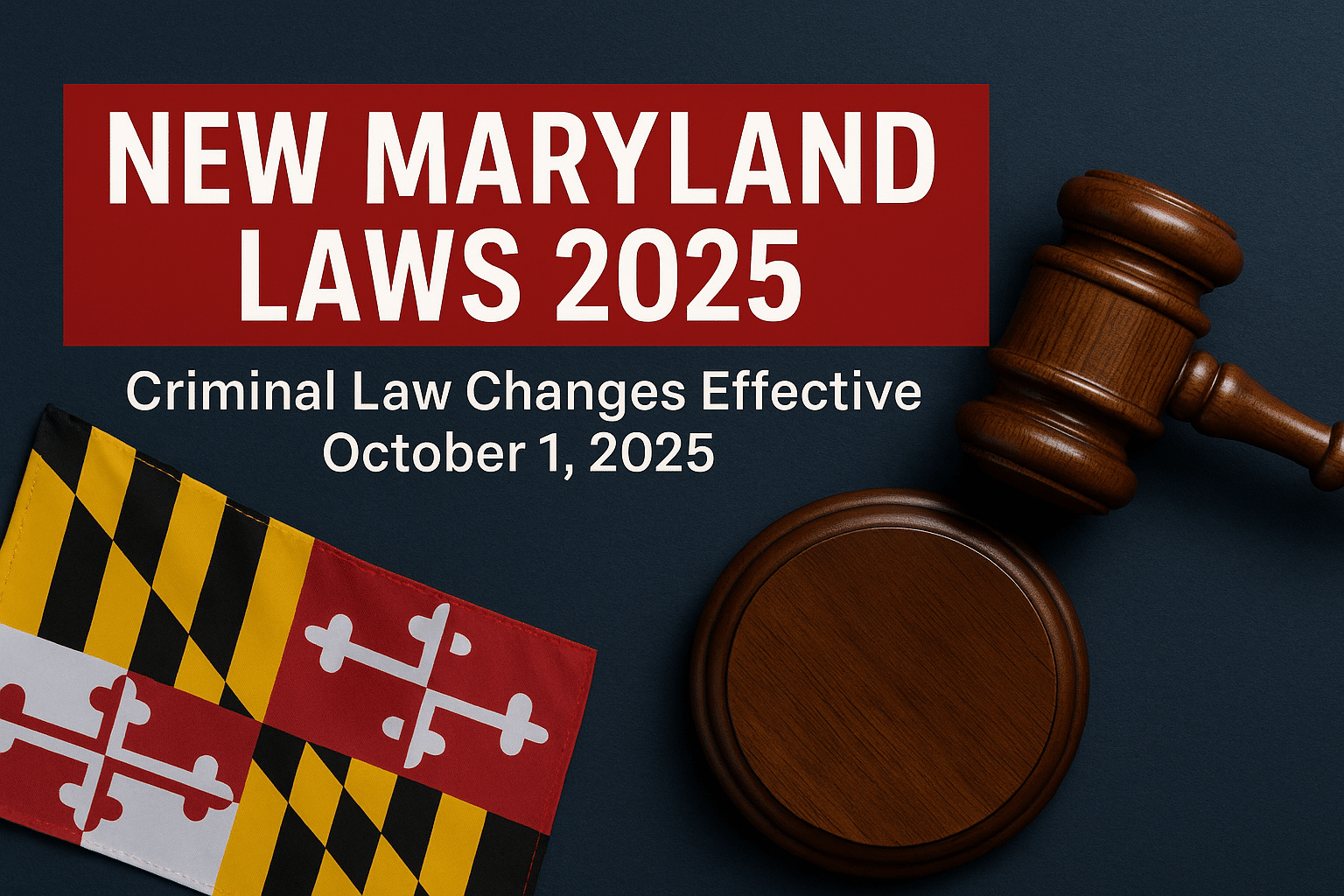
Every year, Maryland lawmakers pass bills that take effect on October 1, the traditional date for new state laws to roll out. In 2025, several criminal law changes will reshape the legal landscape, from harsher penalties for reckless driving to expanded expungement rights.
For residents of Prince George’s, Charles, Calvert, and St. Mary’s Counties, these updates could have a major impact on daily life, especially for drivers, business owners, and anyone with a past criminal record. Below is a breakdown of the key new Maryland laws 2025 that will take effect on October 1, 2025.
1. The Sergeant Patrick Kepp Act: Harsher Penalties for Reckless Driving
One of the most widely discussed new criminal laws is the Sergeant Patrick Kepp Act (SB 590, Chapter 447). This legislation significantly increases penalties for reckless driving in Maryland.
Under the new law, anyone caught driving 30 miles per hour or more above the speed limit will face criminal charges. Instead of just a citation, this offense will now be treated as reckless driving, carrying up to 60 days in jail and fines of up to $1,000.
Other changes include:
- Negligent driving fines increasing to $750.
- A new definition of aggressive driving: committing three or more dangerous violations during a single incident (such as tailgating, running a red light, or failing to yield). Aggressive driving can now result in fines up to $1,000.
This law directly responds to concerns about road safety and will have serious consequences for drivers across Southern Maryland. What once may have been considered a traffic violation could now result in jail time.
2. Expungement Reform Act of 2025: Expanded Rights to Clear Records
Maryland has steadily broadened access to expungement, and starting October 1, 2025, the Expungement Reform Act of 2025 takes things further.
Key highlights include:
- Expanded eligibility: More misdemeanor offenses can be expunged, including resisting arrest (§ 9-408), false statements to police (§ 9-501 and § 9-502), driving without a license (§ 16-101 Transportation Article), and certain theft- and fraud-related charges like credit card theft (§ 8-204) and counterfeit prescriptions (§ 8-610).
- Shorter waiting periods: The waiting period for expungement will now begin after completion of the sentence, including probation or parole, instead of after the conviction date. This means individuals may become eligible sooner.
- Improved privacy: Beginning in January 2026, Maryland Judiciary Case Search will no longer display certain pardoned or cannabis-related convictions. While this part doesn’t take effect until 2026, it is tied to the 2025 reform package.
For many in Prince George’s, Charles, Calvert, and St. Mary’s Counties, these changes represent a critical opportunity to wipe the slate clean and pursue better jobs, housing, or educational opportunities.
3. Organized Retail Theft Act: Cracking Down on Shoplifting Rings
Retailers in Maryland have long complained about organized theft groups, and lawmakers have responded. On October 1, 2025, the Organized Retail Theft Act goes into effect.
This law makes it a felony to participate in organized shoplifting schemes. Prosecutors will have more tools to pursue cases against individuals or groups that coordinate thefts, resell stolen goods, or use online marketplaces to profit from stolen merchandise.
For business owners in Southern Maryland, this is a welcome change. The law is designed to protect local shops and national retailers alike, ensuring that theft rings face serious criminal consequences.
4. Concealing Human Remains: New Felony Offense
Another new Maryland law taking effect October 1, 2025, creates a standalone felony for concealing human remains.
It will now be a crime to intentionally dismember, bury, or dispose of a body in order to hide evidence of a crime. A person convicted of this offense could face up to five years in prison.
This change closes a gap in Maryland law by addressing acts that obstruct investigations or delay justice for families of victims. Prosecutors in Prince George’s, Charles, Calvert, and St. Mary’s Counties will now have a clear statute to use in these situations.
Why These Changes Matter Locally
These new Maryland laws in 2025 reflect two major priorities:
- Public safety – by imposing harsher penalties on reckless drivers and organized thieves.
- Second chances – by expanding expungement rights for people with certain criminal records.
For residents of Southern Maryland, the effects will be felt on the roads, in the courts, and in the local economy. Whether you’re a driver, a business owner, or someone looking for a clean slate, it’s important to understand how these updates could affect your rights and responsibilities.
Final Thoughts
Maryland’s October 1, 2025 criminal law changes bring both tougher penalties and more opportunities for relief. From reckless driving penalties under the Sergeant Patrick Kepp Act to broader expungement rights under the Reform Act, the law continues to evolve in ways that impact everyday people.
At Southern Maryland Criminal Defense, we keep a close eye on legislative changes that affect our community in Prince George’s, Charles, Calvert, and St. Mary’s Counties. If you or a loved one are facing charges under these new laws—or if you want to explore expungement options—our team is here to help.
👉 Schedule a consultation today to learn more about how these new Maryland laws 2025 could affect your case.
